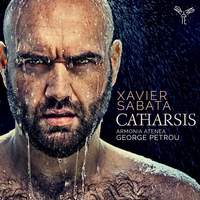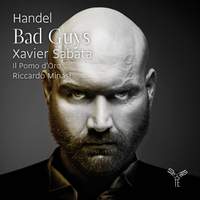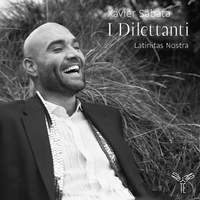Interview,
Xavier Sabata on Catharsis
 The Catalan countertenor Xavier Sabata is one of the most compelling baroque singers around at the moment, combining scintillating technique and an instantly recognisable timbre with a magnetic stage-presence and dramatic instinct that can elicit sympathy for even the most repellent of operatic villains; tonight he makes his Wigmore Hall debut with a programme centring on the concept of catharsis, which includes music by Ariosti, Caldara, Handel, Hasse, Vivaldi and more.
The Catalan countertenor Xavier Sabata is one of the most compelling baroque singers around at the moment, combining scintillating technique and an instantly recognisable timbre with a magnetic stage-presence and dramatic instinct that can elicit sympathy for even the most repellent of operatic villains; tonight he makes his Wigmore Hall debut with a programme centring on the concept of catharsis, which includes music by Ariosti, Caldara, Handel, Hasse, Vivaldi and more.
I met up with Xavier in London over the summer to talk about his background in theatre and relatively late discovery of his voice, the inspirations behind the tonight’s recital-programme and its sister-recording, and of course THAT cover-photo – a hot contender for Presto's unofficial Record-Sleeve of the Year Award!
This is your debut at the Wigmore Hall - tell me a little about how you got here and what significance the venue has for you
Firstly, I’m very honoured that I’ve been invited to perform in such a prestigious venue in a country with so many great countertenors. I arrived in the opera world quite late, because I initially trained and worked as an actor. But I got a bit frustrated about the theatre because of the language-restrictions (we were limited to Catalan and Spanish), and when I was in my mid-twenties a CD of a countertenor singing Handel came into my hands and I thought ‘This is something I can do! This is what I want to explore!’. I discovered a whole new world, and felt really connected not just to the music but to the poetry and the overall aesthetic, regardless of the nationality: the French baroque, Spanish baroque, Italian baroque, I loved everything! So I quit my acting career and did an undergraduate degree as a countertenor, specialising in what’s called ‘historical singing’ in Spain. I then went to Germany to do a masters in Lied, because my obsession with the baroque is really based on singing through the words and colouring text: it was a two-year course with Hartmut Höll and Mitsuko Shirai, and afterwards I did an audition with William Christie and Le Jardin des Voix. It all seemed to happen in a very organic and easy way!
You sound so very different from the earlier generations of countertenors, particularly those trained in the English cathedral tradition…
Very soon I discovered that my voice was working in a way that didn’t fit into any existing tradition, and that gave me quite a lot of nightmares at the time! You meet a lot of old teachers of early music who say ‘No, you have to sing this music without vibrato!’, and it’s like trying to fit into a corset that’s not made for you! And I thank god for people like William Christie, who took my hands and said ‘Just sing!’. Fortunately I appeared at the right moment, where countertenors are appreciated in big opera-houses and 1000-seater concert-halls: in venues like that you need to be heard, and if you don’t work with a certain vocal technique, then you won’t be!
And if you go back and consider all the noise that would’ve have been going on in eighteenth-century theatres, you have to assume that the great castrati could also project like this: Farinelli, or let’s say Senesino, because Senesino is MY castrato – his roles are where I feel comfortable and at home! I connect very much with Orlando, which I’m singing next year, but this year is all about Rinaldo! There are two versions of Rinaldo – one from 1711, which was written for Nicolini, and another which he revised for Senesino twenty years later (1731). It’s rarely performed, but it’s been published by Bärenreiter and they asked me to do a tour with Sandrine Piau and Christophe Rousset and the Kammerorchesterbasel. Handel writing for Senesino is completely different from Handel writing for Nicolini; I think that so much of the style of the eighteenth century is determined by the singers, not the composers. The stronger the collaboration between the two, the better the result.
You’re very involved with contemporary opera as well as baroque repertoire: does what you’ve said there hold true for the new works you’ve been involved with yourself?
Recently I worked on Hans Thomalla’s opera Kaspar Hauser, about a German boy who was kept in a cellar for ten years and then escaped. It was an extraordinary process because we worked together on it for two years, constantly asking questions of one another. It took five or six sessions for him to understand how my voice worked, and for me to understand what he wanted with his writing; and then the result was like haute couture! Nothing feels artificial. And I’m sure it was the same with Handel and Senesino.
You mentioned your passion for lieder - do you have any plans you can share on this front with us?
I’ve sung Dichterliebe in concert, quite soon after my Masters, but since then I’ve done almost no concerts with piano. I did do the Britten canticles in the Bastille with a wonderful French tenor (Cyrille Dubois) and Stéphane Degout, and next season I’m doing two big lied concerts – one is at the Teatro de la Zarzuela as part of the ‘Ciclo de Lied’, which is the most important Lieder festival in Spain, where I will present a beautiful programme around the language of the Mediterranean, singing in Spanish, Catalan, Occitan, French, Italian and Greek! It’s music from the late eighteenth and nineteenth centuries, and after that I do Winterreise in Barcelona. That’ll be with fortepiano, not because I’m chasing any sort of ‘historical’ sound (because there is nothing ‘historical’ about a countertenor singing Winterreise!), but because I want to try get close to what a Liederabend in Schubert’s time would have been like, with people gathered at home around the piano – doing a cycle like this in a huge concert-hall doesn’t make any sense to me. When I was in Germany, I had to fight a lot to do this sort of thing – people were almost suspicious of a countertenor doing these songs, especially because my delivery is so dramatic and theatrical. I’d say ‘Just treat me as a contralto! A contralto can be masculine, dramatic and lyrical – don’t treat me as some sort of strange being!’.
It seems to me that attitudes to gender and voice have started to evolve quite dramatically, even over the past five or six years…
Now is the best time! Today, if you want to, you can cast any castrato role with a male singer: I can think of three countertenors who can do an amazing Ariodante, for instance, and then there’s all the flamboyant Neapolitan stuff that Franco [Fagioli] does…nobody can sing Caffarelli’s music the way he can! We’re very good friends, and the main thing about Franco is that he’s totally convincing in every aspect of his performance – technically, emotionally, and theatrically. And this makes opera-houses more likely to hire us: people go to the opera these days and say ‘Oh I didn’t even realise that was a countertenor!’. Maybe 25 or 30 years ago it was enough for a countertenor to have a career at all, but nowadays it’s like any other voice-type – you need to achieve a certain level, dramatically and musically, in order to have an operatic career. If you want to sing church music the whole of your life (as earlier generations did) then that’s fine, but to cross that bridge into opera you have to have the full package.
What recording plans are in the pipeline for you, and what have been the inspirations behind your recital-discs so far?
Next year I’ll record a Stradella opera with Il Pomo d’Oro, La Doriclea, and I honestly think Stradella will be the new thing! He himself was an alto, and I’m going to record the lowest castrato role I’ve ever done in my life (down to a low E and up for two octaves). I have colleagues who say ‘These are my roles, that’s that!’, but I need to dig! For instance, the idea for the first solo album I did, I dilettanti, came from my research into a composer called Giovanni Maria Ruggieri: I found he was nicknamed ‘the amateur’, which often has slightly negative connotations in English, but in Italian it simply means somebody who’s in a good position because he can allow himself to do things for himself. I immediately thought of my grandfather, who was a self-trained musician – he would play accordion, violin, guitar, in the Catalan Pyrenees, and I decided to do a CD that was based on that energy and enthusiasm of people who didn’t need to produce music to earn money.
Bad Guys came from the Handel Festspiele, who’d invited me to do a recital at the time when I was singing a lot of villains, and I thought ‘Why not build a recital around these figures?’. These guys are stereotypically ‘bad’, but their music is so beautiful that you can’t do it justice with ugly singing – how can you sing ‘Pena tiranna’ (from Amadigi) with an ugly voice?! I like complex things, so for me it was a certain statement of intent: nothing’s ever black or white. Rinaldo is not ‘better’ than the others, and Cesare is not ‘better’ than Tolomeo! All of them have dark sides and bright sides, and maybe the difference between them is just the lack of emotional intelligence which drives them to do things that maybe the hero wouldn’t dare to do - but it doesn’t mean that the desires aren’t there. I love the dramatic complexity which Handel brings, and I never judge the characters I play: my obsession is to humanise them, to take them home with me. Take Tamerlano: if you judge him from the surface he’s just a jerk, but I decided to perform him as a guy is dying for intimacy and the only way he knows how to get it is by being violent and aggressive. And we all know that there are people like that in the world. I never decide whether the characters I sing are good or bad: it’s so one-dimensional. I remember many years ago a director said to me ‘This is the noble character!’, and I said ‘And…? What do I do now, sit here and nobly drink a cup of tea?’.
Catharsis is more about the way I see opera than it is about any musical concept. I’m very happy when I have long accompanied recitatives, colouring all the words, finding nuances in all the phrases…that turns me on more than singing endless coloratura. The term of course comes from Classical theatre, and most of these operas have Classical plots, so I started by mapping out the emotional high-points of each drama. I enlisted some help from musicologists on this one, because I’d say 70% of the arias on that disc are world premiere recordings, including the Vivaldi. It’s from a version of Farnace which he started to rework for alto but never finished: in fact only two arias survive, and for me they’re central point of this whole programme.
Finally, the cover for Catharsis has attracted a lot of attention! Was this your own concept, and what sort of reaction did you get?
The idea of catharsis has associations with all four elements, but water seemed to me the one that conveys the idea of cleansing most powerfully. I asked the photographer if what I had in mind was possible and he said ‘You’re crazy, but we’ll try it!’. I was prepared for people saying it was too much, or just a gimmick to sell more records, but really it’s all about freshness: sometimes we’re so contaminated by so many things that we need to stop and enjoy things without any frame. Some people who are very conservative might be offended, but to be honest I don’t care – I already have the next cover in my mind…! The album will be about the figure of Alexander the Great: it’ll be called L’Alessandro amante, and it will be staged in one of the theatres in Barcelona where I worked years ago (with a director I know from my time as an actor) so there will also be a live recording on video.
'Sabata starts with the considerable asset of a well-formed and appealing tonal quality which, combined with evident musical intelligence, ensures his singing of lyrical music is unfailingly rewarding.' (Opera Magazine)
Available Formats: MP3, FLAC, Hi-Res FLAC
'This ranks among the most intelligent and striking recital discs of recent years...The beauty of Sabata's singing is breathtaking, however unsettling his characters. We are constantly aware of Handel's ability to tell us how these men have become who and what they are...Matchless, and highly recommended.' (The Guardian)
Available Formats: CD, MP3, FLAC, Hi-Res FLAC
I Dilettanti
Xavier Sabata (countertenor), Latinitas nostra, Markellos Chryssikos (harpsichord and direction)
'An original and stimulating idea for a recital … [Sabata] has a rich and glorious tone, seemingly-limitless breath control and a formidable dramatic sense, all of which are fully deployed here.' (Early Music Review)
Available Formats: MP3, FLAC, Hi-Res FLAC





